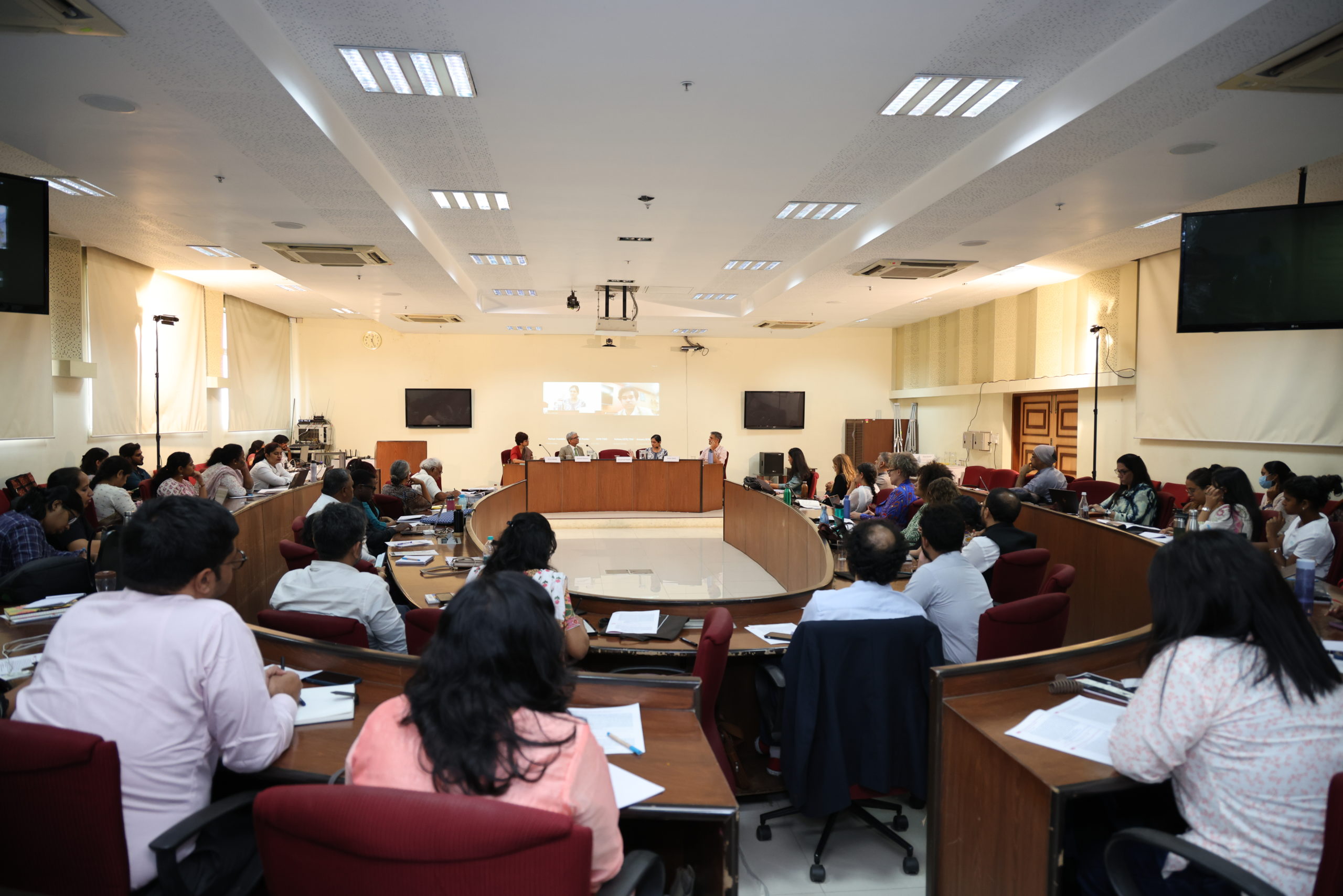Event Highlights: Symposium on Innovative Financing for Education
Date: Wednesday 6 November 2024
Time: 5am to 1pm CET / 9.30am to 5.30pm IST
Location: Tata Institute of Social Sciences, Mumbai, India and Online (Zoom)
On 6th November 2024, the Centre of Excellence in Teacher Education at the Tata Institute of Social Sciences (CETE-TISS) organised the first-of-its-kind symposium on Innovative Financing for Education (IFE) in Mumbai, India. Welcoming participants in-person and online, the event engaged Indian education and development experts in an evidence-informed dialogue on the use of IFE. The event, supported by NORRAG – the Global Education Centre of the Geneva Graduate Institute, was made possible thanks to a grant from the Leading House South Asia and Iran (Zurich University of Applied Sciences).
It drew upon the expertise of diverse actors engaged in outcomes-based financing (OBF) in India including private investors, philanthropists, service providers, researchers and academics with sessions focusing on private investment and corporate social responsibility (CSR) for education, experiences of implementing IFE programmes, and systemic changes in the Indian education sector. An overview of each session is presented below.
The symposium was organised by the Centre of Excellence in Teacher Education at the Tata Institute of Social Sciences (TISS), supported by NORRAG, as part of the IFE-2-Leave No One Behind project. It was made possible thanks to a grant from the Leading House South Asia and Iran, Zurich University of Applied Sciences (ZHAW).
Inaugural Session
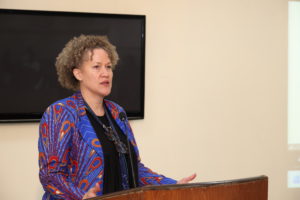
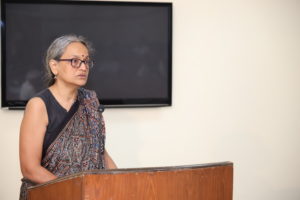
Padma Sarangapani (CETE-TISS) and Moira V Faul (NORRAG) opened the event, setting the stage for exploring the use of IFE in India. Padma Sarangapani recognised the significance of the event, expressing CETE-TISS’ “delight to be able to bring this first-of-a-kind symposium to India”. This view was echoed by Moira V Faul who emphasised that it is “critical to start discussing [IFE] within the context in which these projects are being carried out”. Moira V Faul also emphasised the multifaceted and broad nature of IFE, recognising that “we don’t yet have a single definition for innovative financing; the more we explore, the more we uncover different modalities and initiatives”. The subsequent panels reflected this, covering various topics including private investments, new philanthropy, CSR, OBF and the Indian IFE ecosystem.
Panel 1. Non-State Investment for Educational Outcomes: Experimentation to Evidence.
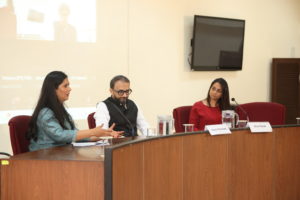
The first panel, facilitated by Arushi Terway (NORRAG), brought together Dhun Davar (UBS Optimus Foundation), Harish Ahuja (Social Stock Exchange) and Nirav Khambhati (Blended Finance Company) to discuss ways non-state actors can contribute to improving educational outcomes in India.
Dhun Davar set the scene by saying, “We have over a $4 trillion financing gap to achieve the Sustainable Development Goals. What this tells us is that it’s critical we identify and use resources effectively”. Leading on from this, panellists discussed the use of IFE mechanisms – including impact bonds and blended finance, advocating that they are potential means for mobilising private and philanthropic investments to complement public funding.
Dhun Davar shared experiences from the UBS Optimus Foundation-funded Educate Girls Development Impact Bond that resulted in 79% better learning outcomes for students in treatment schools compared to control groups. Harish Ahuja presented India’s Social Stock Exchange – an innovative platform for social enterprises to raise money from equity and debt. In this mechanism, NGOs determine their targeted outcomes and have them audited annually. Additionally, Nirav Khambhati discussed blended finance (combining concessional capital with private investment) to de-risk investments, attract more funding, and address challenges like affordability and quality in education.
The panel discussed the promise that shifting from input-based to outcomes-based approaches holds for promoting efficiency but collaborative ecosystems are key. Collaboration between stakeholders to address complex educational challenges is critical along with knowledge sharing, cross-sector partnerships and evidence-based decision-making. However, an over-reliance on pre-implementation evidence as a prerequisite for action was cautioned by Nirav Khambati who suggested that “waiting for evidence is only going to make matters worse” and hinder urgent investments in education. He compared education to the climate sector which often implements programmes based on projections. However, panel moderator, Arushi Terway also signified the importance of evidence-driven approaches to IFE, stating, “We need to be talking to each other and learning from each other.”
This session provided valuable insights into the transformative potential of non-state investments in education and the need for continuous examination of successes and challenges. It advocated for innovative and collaborative approaches to improving outcomes for underserved populations.
Panel 2. A Decade of CSR Engagement in Education: What’s Next?
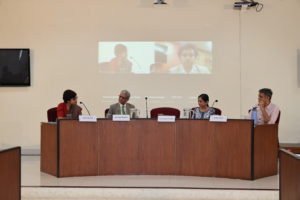
The second panel on corporate social responsibility (CSR) brought Aman Bhaiya (SBI Foundation), Ankur Sarin (Indian Institute of Management Ahmedabad), Ashwini Saxena (JSW Foundation) and Anushree Parekh (British Asian Trust), together for a discussion moderated by Emon Nandi (CETE-TISS).
The panel discussion explored the evolution, achievements, and challenges of CSR in India’s education sector over the past decade, particularly noting the impact of the 2013 legal mandate that has reshaped CSR in India, transitioning it from sporadic philanthropic activities to structured, outcome-driven strategies. It highlighted how organisations are shifting their focus from one-time contributions (e.g. donating buses or renovating schools) to longer-term programmes targeting educational challenges. In the words of Anushree Parekh, it is becoming more “more structured, […] more strategic, […] more thoughtful [and] more long term”.
The panel also touched on the use of CSR funds in innovative financing mechanisms, such as the Haryana Early Literacy Development Impact Bond (DIB). Panellists shared how impact bond models can foster collaboration between stakeholders, give flexibility to implementers and focus on measurable outcomes, with Aman Bhaiya stating that the Haryana DIB experience was “not only collaboration, it was collective wisdom”.
The panellists advocated for greater collaboration among stakeholders, including private sector actors, NGOs, academic institutions, and governments, to maximise the impact of CSR initiatives, recognising it as a potential catalytic force for social change.
Panel 3. New Philanthropy and Outcomes-Based Financing for Education: What Works and What Does Not
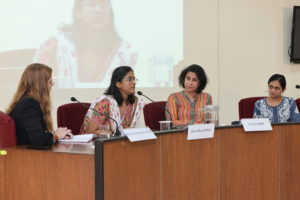
Panellists Anushree Parekh (British Asian Trust), Jinny Uppal (Centre for Social Impact and Philanthropy, Ashoka University) and Shrutika Jadhav (Dasra) joined facilitator Marina Dreux Frotté (NORRAG) for an insightful conversation on OBF around the theme of new philanthropy.
The panel discussion explored the evolving role of philanthropy and OBF in advancing education in India, highlighting the opportunities and challenges of these approaches. Shrutika Jadhav said “there’s a lot of domestic philanthropy that’s showing a lot of promise” and panellists noted a shift from traditional charitable giving to structured, impact-driven models focused on measurable outcomes. They discussed how OBF introduces new players and financial instruments into the sector, offering innovative ways to optimise resources and address specific challenges. However, concerns were raised about scalability, accessibility for grassroots organisations, and the risk of neglecting complex social issues that are harder to quantify and measure.
Panellists also emphasised the importance of building trust-based partnerships, enhancing organisational capacity, and ensuring flexibility in funding mechanisms. Anushree Parekh, reflecting on Quality Education India DIB, spoke about trust generation in OBF programmes, calling them “a journey or a continuum where you’re starting with something that feels very transactional or contractual [and] trust is getting generated in the process” because of the alignment on the problem to be solved and outcomes to be achieved.
Overall, panellists advocated for participatory approaches to integrate diverse stakeholders and address gaps in the current system. Jinny Uppal surmised that: “I think [OBF] is a great story to tell that the sector is trying many different ways of making things better or getting there in a better way”. Speaking about and beyond OBF, Shrutika Jadhav said there is “a need to experiment with some kind of instruments that allow for private philanthropy to move into solving social problems”. The discussion concluded with this call for experimentation as well as for knowledge-sharing and a focus on systemic change to maximise the impact of philanthropic efforts in education.
Panel 4. Creating Social Impact: The ‘Highs’ and ‘Lows’ of Implementing Outcomes-Focused Education Projects in India
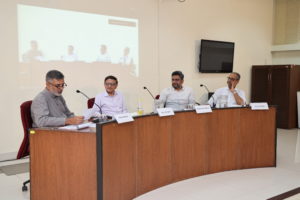
The fourth panel brought together Arun Poddar (Kaivalya Education Foundation), Dhir Jhingran (Language and Learning Foundation) and Madhukar Banuri (Leadership for Equity) to discuss opportunities and challenges of outcomes-focused projects in India, moderated by Vikas Maniar (CETE-TISS).
Key themes included the role of measurable outcomes in driving accountability and the importance of aligning organisational goals with government priorities. Arun Poddar signified that measurement is key “to see what is working and what is not”, and also Dhir Jhingran emphasised the importance of evidence saying, “It’s very important to understand what has worked well, what has not worked well, in what context, for whom and why”. They also highlighted the importance of government ownership, public funding, and long-term partnerships to embed efforts within public systems to ensure their sustainability with Madhukar Banuri saying, “Until you get the government to put skin in the game, it is not going to be sustainable”.
The panellists emphasised that while OBF can enhance efficiency and focus, it must avoid a narrow emphasis on metrics that overlook holistic child development and inclusion of harder-to-reach populations. Ultimately, the session underscored that effective education reform requires a balance between measurable results, capacity building, system strengthening and leveraging data for informed decision-making to create a meaningful, scalable and lasting impact.
Panel 5. Systemic Change and Building IFE Ecosystem in Indian Education Sector

Padma Sarangapani (CETE-TISS) chaired the fifth and final panel of the day, joined by Amrita Patwardhan (Tata Trusts), J.B.G. Tilak (formerly – National Institute of Educational Planning and Administration), and Priya Subbaraman (Dhiraa Skill Development Foundation) to discuss the Indian IFE ecosystem.
Panellists discussed the evolving role of the state and private sector in addressing education funding challenges and debated the potential of IFE mechanisms, stressing the importance of aligning public and private efforts to uphold education as a public good. Whilst public funding remains central to education financing, complementary innovative approaches such as OBF were also discussed.
Instruments, like impact bonds, are being explored in India and are believed by some to complement government efforts to address challenges such as underfunding and spending inefficiencies. However, concerns were raised about the short-term nature of impact bonds and their inability to address systemic challenges with one panellist cautioning “Anything that’s not measurable will not get funded [and that] means that you’re going to crowd out a lot of necessary parts”. The role of philanthropy in ecosystem strengthening was also underscored, emphasising the preference for longer-term investments for sustainable impact. Ultimately, consensus pointed to financial instruments and partnerships needing to work towards integrating non-state contributions with public education goals rather than creating parallel systems.
Closing Remarks
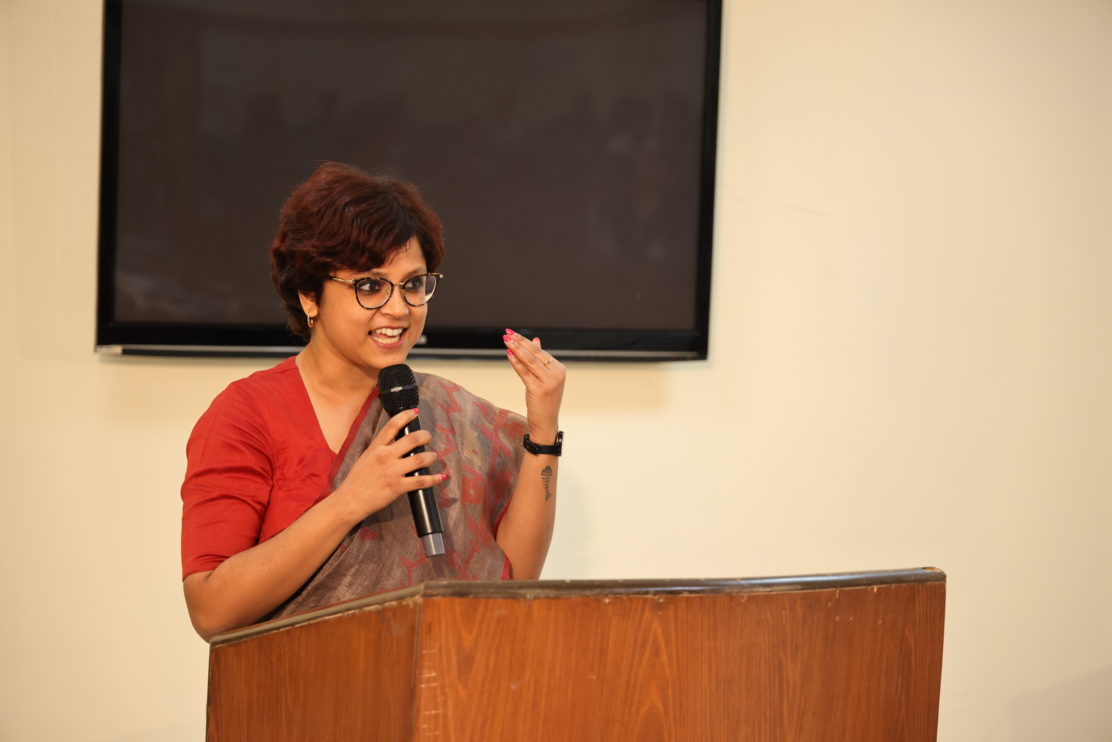
The Symposium on IFE concluded with final remarks from Moira V Faul and Emon Nandi reflecting on the day’s key themes and thanking panellists and organisers. The event emphasised the importance of collaboration, knowledge sharing, and commitment to innovative financing in education, encouraging attendees to carry forward the learnings and connections gained.
Partners:

For enquiries about the event, please contact: kamlesh.goyal@tiss.edu

